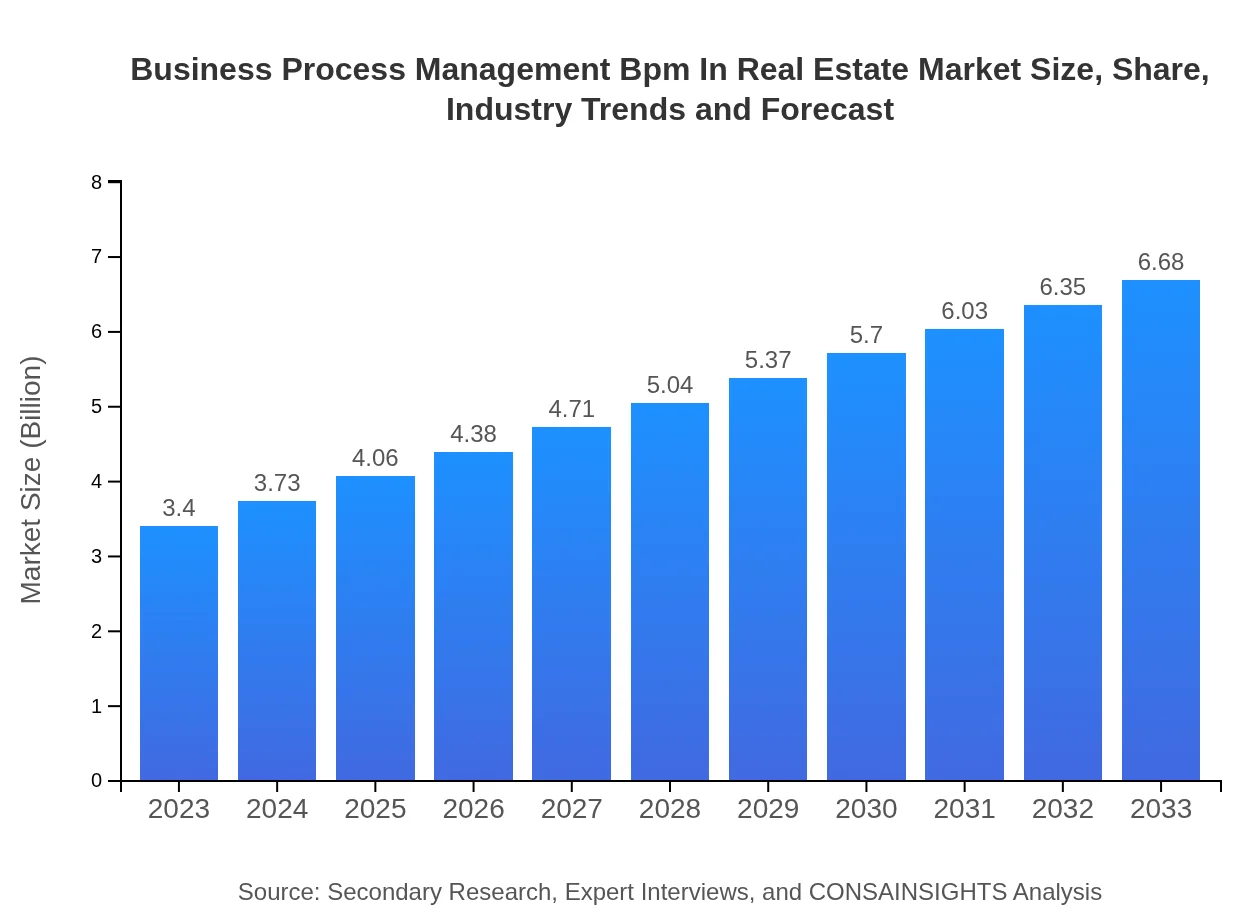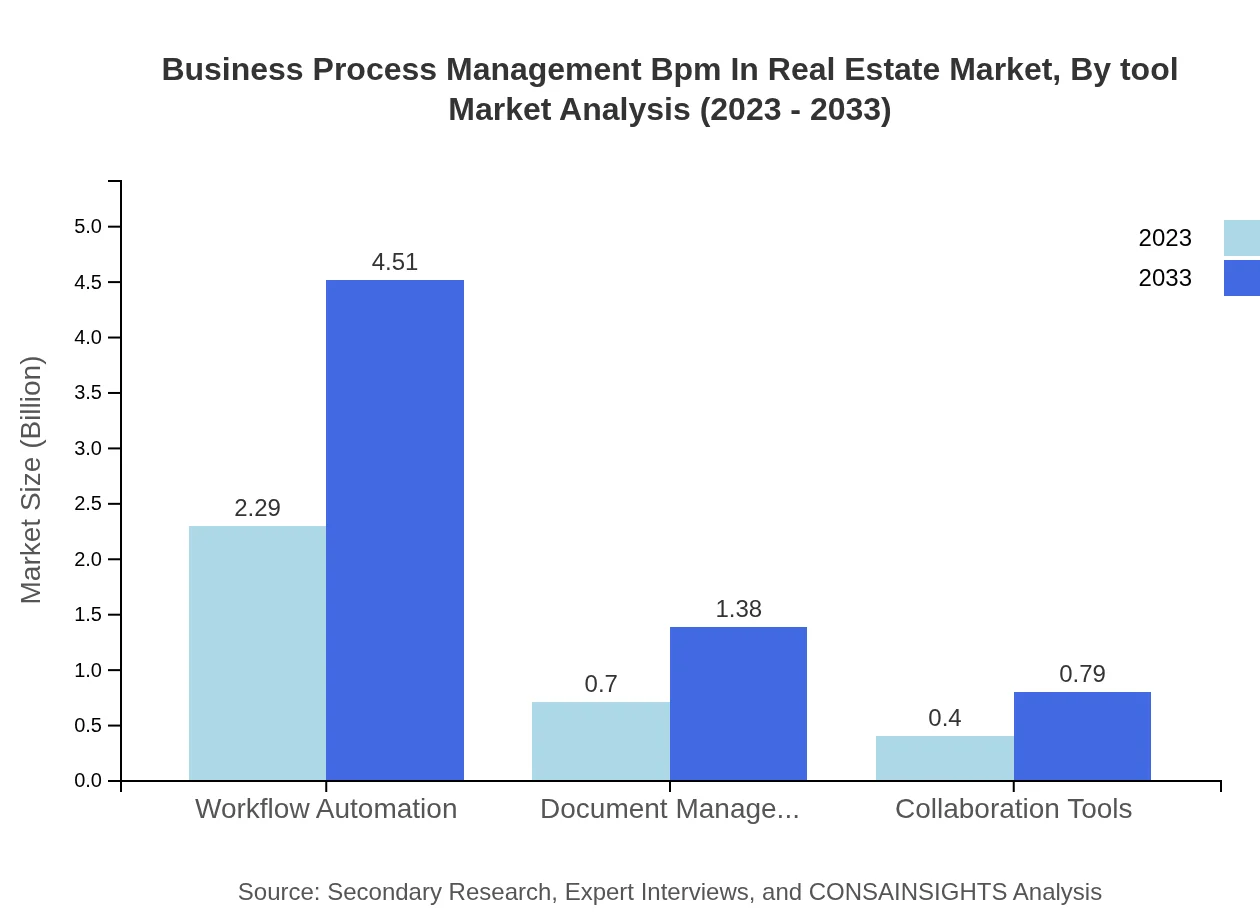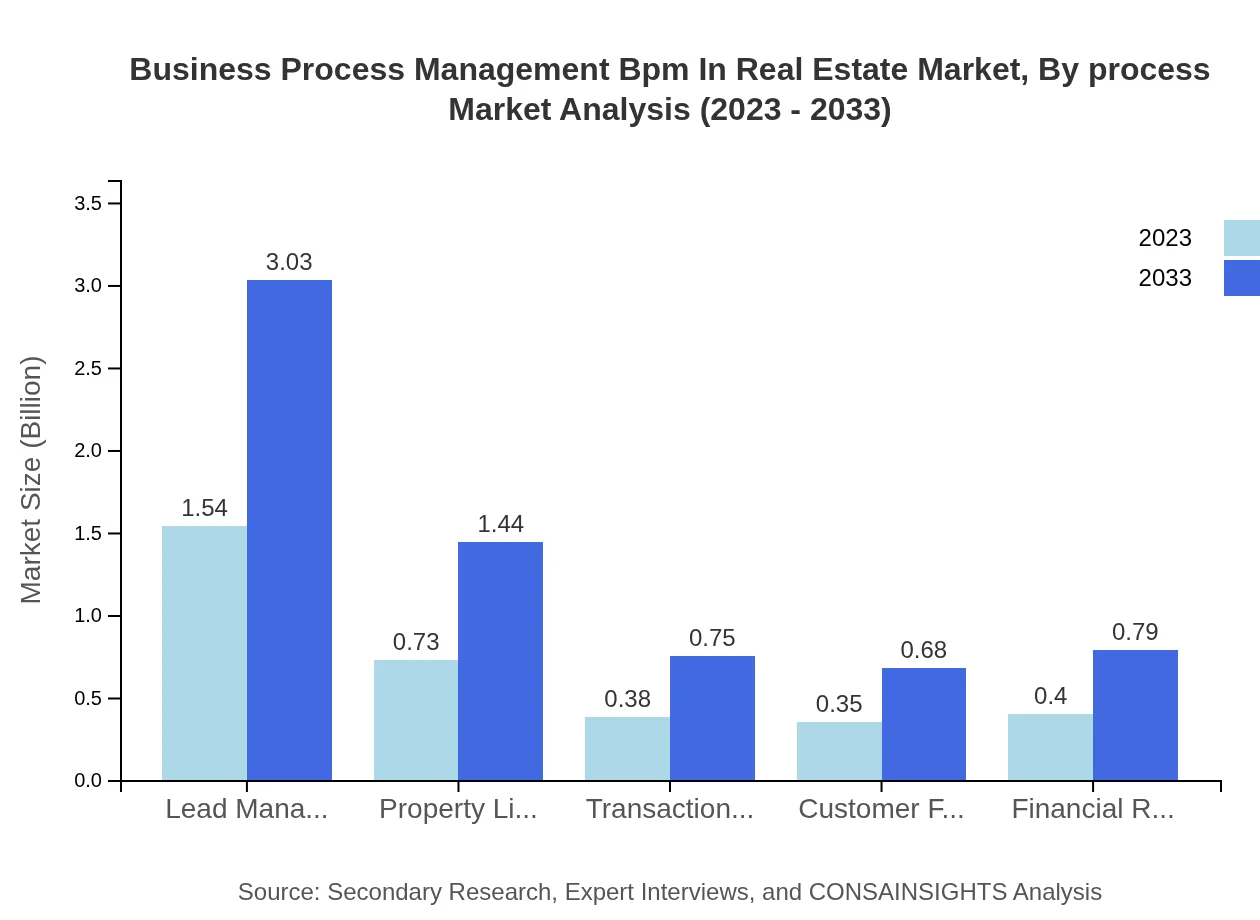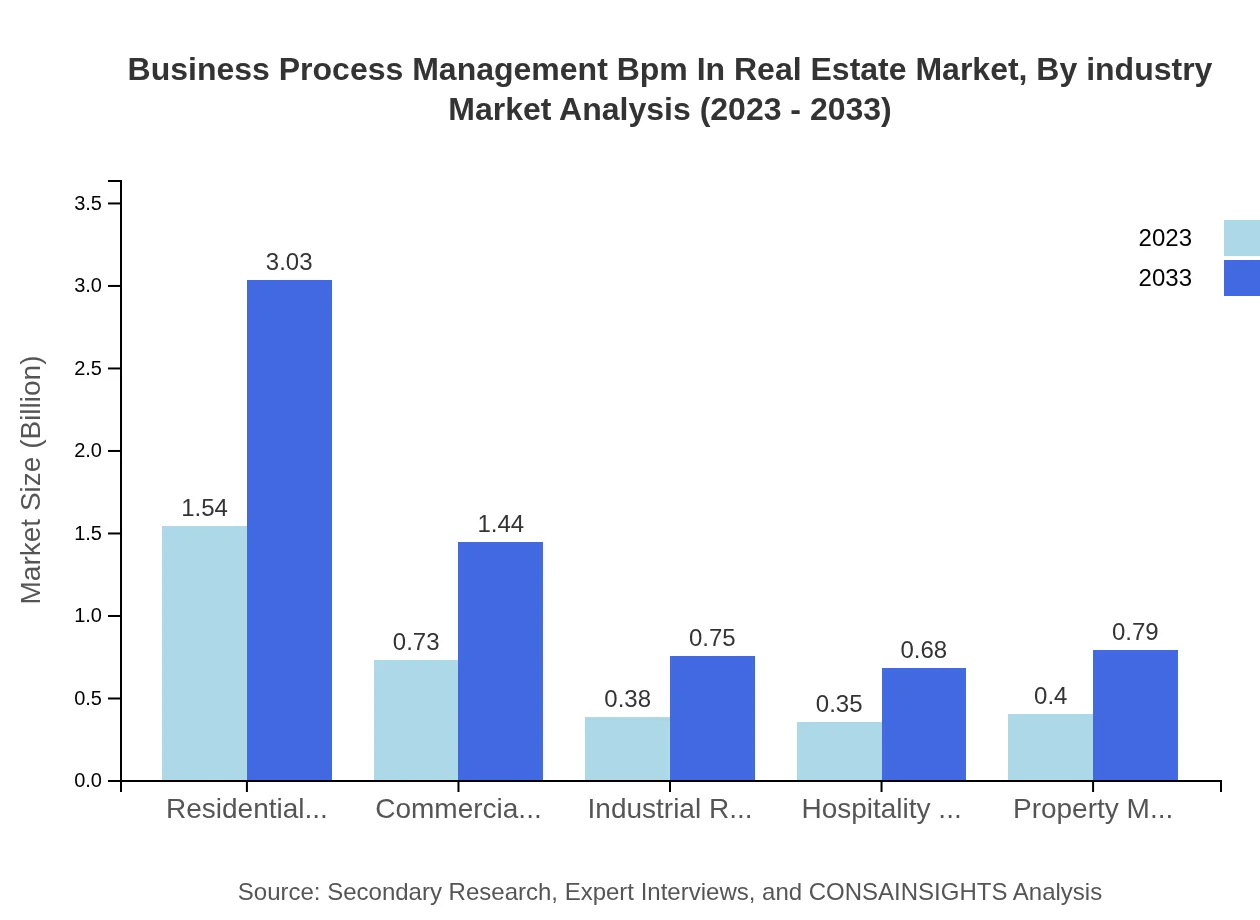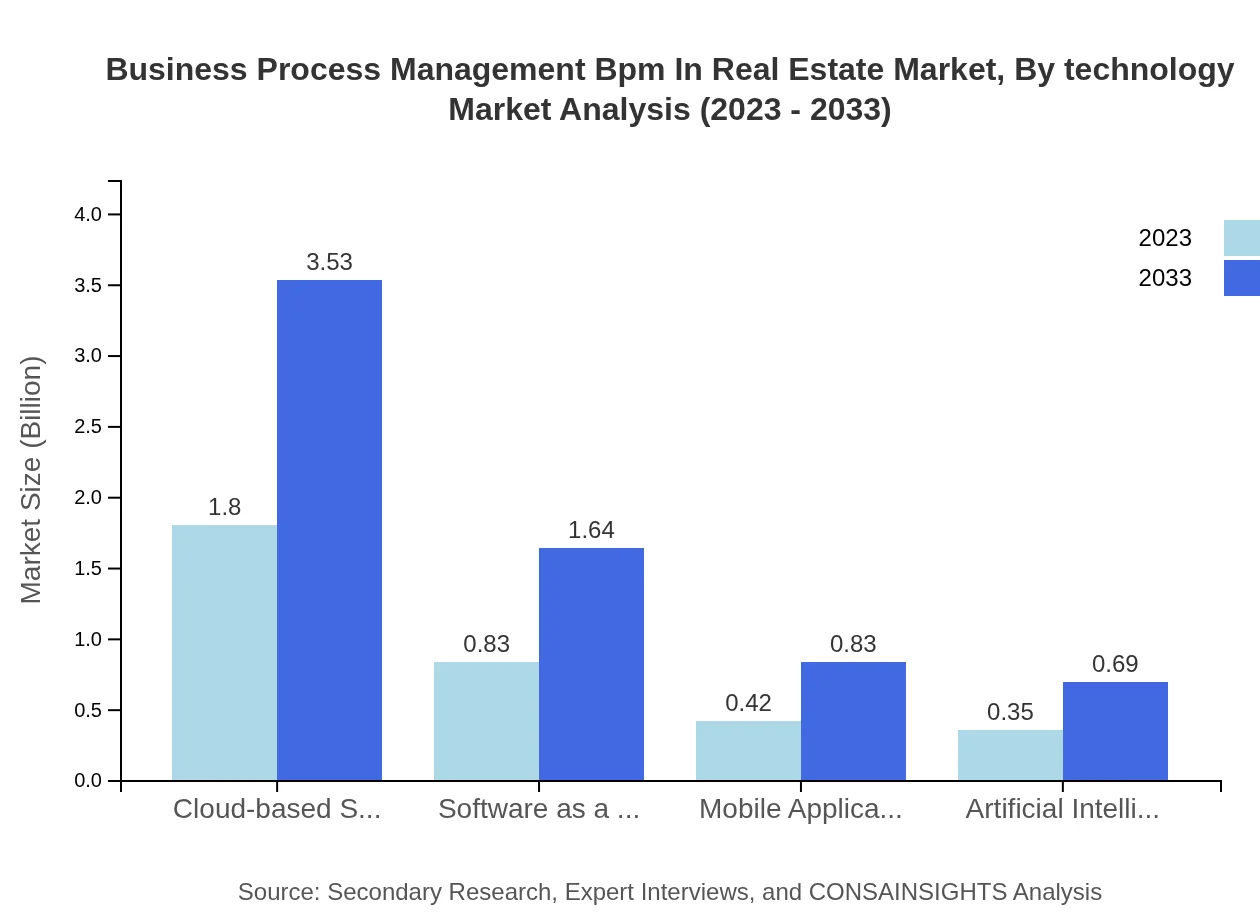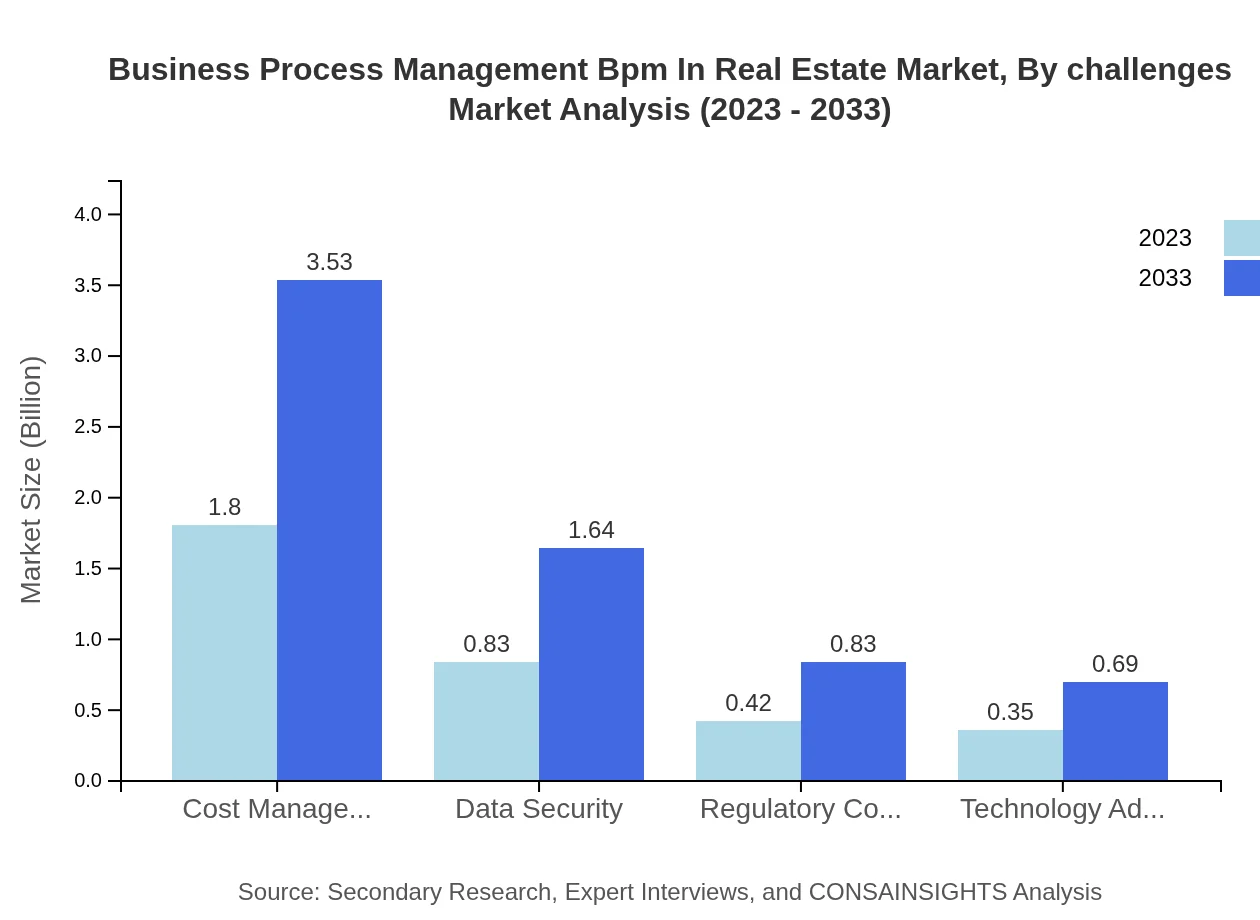Business Process Management Bpm In Real Estate Market Report
Published Date: 24 January 2026 | Report Code: business-process-management-bpm-in-real-estate
Business Process Management Bpm In Real Estate Market Size, Share, Industry Trends and Forecast to 2033
This report provides a comprehensive analysis of the Business Process Management (BPM) market in the real estate sector from 2023 to 2033. It encompasses market size, trends, segmentation, regional insights, and key players shaping the industry landscape.
| Metric | Value |
|---|---|
| Study Period | 2023 - 2033 |
| 2023 Market Size | $3.40 Billion |
| CAGR (2023-2033) | 6.8% |
| 2033 Market Size | $6.68 Billion |
| Top Companies | SAP, Oracle, Microsoft, IBM, Zoho |
| Last Modified Date | 24 January 2026 |
Business Process Management Bpm In Real Estate Market Overview
Customize Business Process Management Bpm In Real Estate Market Report market research report
- ✔ Get in-depth analysis of Business Process Management Bpm In Real Estate market size, growth, and forecasts.
- ✔ Understand Business Process Management Bpm In Real Estate's regional dynamics and industry-specific trends.
- ✔ Identify potential applications, end-user demand, and growth segments in Business Process Management Bpm In Real Estate
What is the Market Size & CAGR of Business Process Management Bpm In Real Estate market in 2023?
Business Process Management Bpm In Real Estate Industry Analysis
Business Process Management Bpm In Real Estate Market Segmentation and Scope
Tell us your focus area and get a customized research report.
Business Process Management Bpm In Real Estate Market Analysis Report by Region
Europe Business Process Management Bpm In Real Estate Market Report:
The European BPM market in real estate is set to see significant growth, with an estimated value of $1.02 billion in 2023, anticipated to reach $2.00 billion by 2033. The stringent regulatory environment, coupled with evolving customer expectations, is encouraging real estate firms to adopt BPM solutions to improve compliance and enhance service quality.Asia Pacific Business Process Management Bpm In Real Estate Market Report:
The Asia Pacific region has a growing BPM market in real estate, valued at $0.64 billion in 2023 and projected to reach approximately $1.26 billion by 2033. This growth is driven by rapid urbanization, the rise of smart cities, and increasing investments in property development. Economies like China and India are leading the charge, witnessing higher adoption rates of BPM solutions, especially in urban planning and property management.North America Business Process Management Bpm In Real Estate Market Report:
North America leads the BPM market in real estate, with a market size of $1.30 billion in 2023 projected to nearly double to $2.56 billion by 2033. Technological innovations, a competitive market environment, and a strong focus on customer experience drive this expansion. Firms are increasingly investing in cloud solutions and automation tools, ensuring robust operational efficiency.South America Business Process Management Bpm In Real Estate Market Report:
In South America, the BPM market in real estate is currently valued at $0.14 billion, expected to grow to $0.28 billion by 2033. The market is gradually emerging as local firms begin to understand the benefits of automation and efficient business processes. However, challenges such as economic instability and slower adoption rates of technology pose hurdles for growth.Middle East & Africa Business Process Management Bpm In Real Estate Market Report:
In the Middle East and Africa, the BPM market is valued at $0.30 billion and projected to reach $0.58 billion by 2033. Growth in this region is driven by a focus on digital transformation in real estate, infrastructure development, and an expanding consumer base looking for quality services and improved process management.Tell us your focus area and get a customized research report.
Business Process Management Bpm In Real Estate Market Analysis By Tool
The BPM in real estate market is dominated by workflow automation, projected to expand from a market size of $2.29 billion in 2023 to $4.51 billion by 2033. Document management and lead management are also significant, with projections showing document management growing from $0.70 billion to $1.38 billion, and lead management from $1.54 billion to $3.03 billion in the same period.
Business Process Management Bpm In Real Estate Market Analysis By Process
Key processes driving BPM in real estate include transaction management, customer feedback management, and financial reporting. Transaction management is projected to grow from $0.38 billion to $0.75 billion, while customer feedback management grows from $0.35 billion to $0.68 billion over the forecast period.
Business Process Management Bpm In Real Estate Market Analysis By Industry
The segmentation by industry sector includes residential, commercial, industrial, and hospitality. Residential real estate holds the highest market share, valued at $1.54 billion in 2023, expected to grow to $3.03 billion by 2033. Commercial real estate is also noteworthy, with a growth from $0.73 billion to $1.44 billion.
Business Process Management Bpm In Real Estate Market Analysis By Technology
Technologies such as cloud-based solutions and AI integrations are crucial for BPM in real estate. The market for cloud-based solutions is projected to grow from $1.80 billion in 2023 to $3.53 billion by 2033, showcasing the shift towards more scalable and flexible operations.
Business Process Management Bpm In Real Estate Market Analysis By Challenges
Challenges include regulatory compliance, data security, and resistance to new technologies. The market is increasingly focusing on overcoming these challenges by enhancing security measures, ensuring compliance, and promoting the benefits of adopting BPM solutions among traditionally conservative stakeholders.
Business Process Management Bpm In Real Estate Market Trends and Future Forecast
Tell us your focus area and get a customized research report.
Global Market Leaders and Top Companies in Business Process Management Bpm In Real Estate Industry
SAP:
SAP provides comprehensive BPM solutions that help real estate companies streamline their operations, focusing on automation and data analytics.Oracle:
Oracle offers robust BPM platforms designed to enhance real estate transaction management and facilitate regulatory compliance through automated workflows.Microsoft:
Microsoft's cloud-based solutions provide real estate firms with tools to enhance collaboration, improve data management, and drive digital transformation.IBM:
IBM specializes in BPM solutions leveraging artificial intelligence to optimize real estate management and client interactions.Zoho:
Zoho delivers affordable and user-friendly BPM tools aimed at small to medium-sized real estate businesses, focusing on increasing operational efficiency.We're grateful to work with incredible clients.









FAQs
What is the market size of business Process Management Bpm In Real Estate?
The Business Process Management (BPM) in Real Estate market is valued at approximately $3.4 billion in 2023, with a projected CAGR of 6.8% leading up to 2033, reflecting significant growth, fueled by technology integration and efficiency demands.
What are the key market players or companies in this business Process Management Bpm In Real Estate industry?
Key players in the BPM in Real Estate sector include technology firms specializing in workflow automation and real estate management software, along with established consultancies and SaaS providers leveraging automation and analytics for improved processes.
What are the primary factors driving the growth in the business Process Management Bpm In Real Estate industry?
Growth in the BPM sector of Real Estate is primarily driven by rising demand for automation, increasing operational efficiencies, technology adoption such as cloud solutions, and the need for regulatory compliance which collectively enhance competitive advantage.
Which region is the fastest Growing in the business Process Management Bpm In Real Estate?
North America stands as the fastest-growing region in the BPM in Real Estate market, expanding from $1.30 billion in 2023 to nearly $2.56 billion by 2033, reflecting strong adoption of technology and a focus on operational efficiencies.
Does ConsaInsights provide customized market report data for the business Process Management Bpm In Real Estate industry?
Yes, ConsaInsights offers customized market report data tailored to the specific needs of clients in the BPM in Real Estate industry, enabling detailed insights that cater to unique market requirements and strategic objectives.
What deliverables can I expect from this business Process Management Bpm In Real Estate market research project?
Deliverables from the BPM in Real Estate market research project include comprehensive market analysis reports, segment-specific insights, competitive landscape assessments, trend identification, and tailored recommendations based on data-driven findings.
What are the market trends of business Process Management Bpm In Real Estate?
Market trends in BPM for Real Estate indicate a shift towards cloud-based solutions, increased adoption of AI and mobile applications, a focus on data security, and a growing emphasis on regulatory compliance to enhance operational efficiency and customer engagement.

